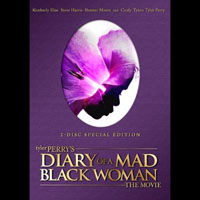 BUY IT AT AMAZON: CLICK HERE AND HERE!
BUY IT AT AMAZON: CLICK HERE AND HERE!
STUDIO: Lions Gate
MSRP: $26.98/$27.98
RATED: PG-13
RUNNING TIME: 116 Minutes/100 Minutes
SPECIAL FEATURES:
(Diary of a Mad Black Woman)
• Audio Commentary by Tyler Perry
• Audio Commentary by director Darren Grant and star Kimberly Elise
• Making of Diary of a Mad Black Woman
• The ATL documentary
• The Real Mad Black Women documentary
• Reflections on Diary documentary
• Music montages
• Tyler Perry Spotlight and Photo Gallery
• Who’s Tyler Perry? Documentary
• Outtakes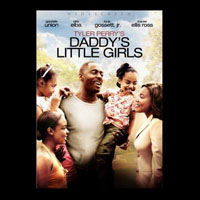 (Daddy’s Little Girls)
(Daddy’s Little Girls)
• Audio Commentary by Tyler Perry
• Extended Church Scene
• Introducing the McClain Sisters
• Atlanta Aquarium: “Working Underwater”
• Tyler’s Team: Cast and Characters
The Pitch
“Tyler Perry IS Black America. Watch and learn, bitches.”
The Humans
Diary– Kimberly Elise, Steve Harris, Shemar Moore, Cicely Tyson, Tyler Perry
Daddy’s– Gabrielle Union, Idris Elba, Louis Gossett Jr., Tracee Ellis Ross
The Nutshell
Diary of a Mad Black Woman is just your everyday story about a successful young wife whose husband pulls a Mr. Hyde one day and kicks her out forcing her to live with her sassy, kicked-outta-The Nutty Professor-auditions family where she falls in love with a hunky U-Haul driver and then cares for her abruptly paralyzed husband.
P.S. This isn’t going to be a positive review.
Daddy’s Little Girls, by comparison, is far more streamlined. A sensitive ex-con/auto mechanic struggling to win custody of his three daughters from his venal ex-wife and her crack dealer husband might also have found true love in the form of an attractive, professional, and yet unlucky-in-love businesswoman.
You know what? Just fuck it.
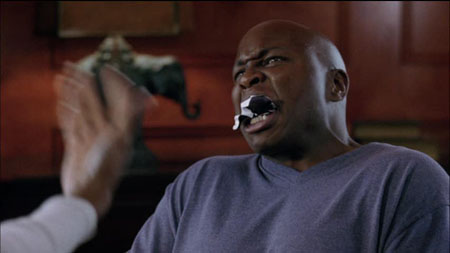
"Oh God, this tastes terrible! Why would you have me eat our wedding picture…oh right, it’s punishment. Still, ewww."
The Lowdown
Based solely on watching Diary of a Mad Black Woman, I am tempted to say Tyler Perry may be the worst American filmmaker working today. This is an appallingly wretched piece of celluloid. It’s predictable, ineptly written, poorly directed, unfunny, un-touching, boring, melodramatic-to-the-point-of-full-system-shutdown, and stereotyped within an inch of its life. If you joke about seeing flicks this bad, let me just say: don’t. You don’t unsee shit like this. It sticks with you. And if IMDB is to be believed, it’s grossed over $50 million dollars on only a $5 or so million dollar budget. Which means many of you have seen this.
For shame.
The thing that gets in my craw is Perry’s massive squandering of all available resources and thematic significance. Maybe this is my “glass is half full” mentality coming through, but he’s not coming from a bad place. I’m sure that, at least when he first set out writing plays/creating cinematic abortions, his intentions were 100% solid. Even this film seems like it started out that way. He’s shooting outside of the Hollywood system near his home in Atlanta. He works with a predominantly African-American cast and crew to showcase their skills and talent; look at how he spotlights Cicely Tyson, for example. Her role makes almost no narrative sense, but you get the sense she’s on camera because Perry reveres her deeply. His work actively tries to combat negative stereotypes in the black community. The gangsta lifestyle and all its accoutrements, the shiftless black male who ignores his family, these are just a couple of the negative (yet pervasive) ideas that Perry comes down on hard. For a filmmaker, and a popular one at that, to push all this stuff to the masses would be dammed admirable…
…if the end result wasn’t so ass. For every good thing Perry and director Darren Grant set out to do, they go and do five terrible things to counter it. This flick is bad from a technical standpoint; scenes run too long, framing is often awkward, and the overall professionalism is sub-Lifetime quality. But hell, that’s minor, in my book. I liked Once quite a bit, and that one looked and sounded worse than this one, technically speaking. Where Perry and crew fail, and fail big, is in the script and the acting. Apparently, Perry’s method for debunking one set of stereotypes is to populate his flick with even more stereotypes. We get the sassy black family, the “sellout” rich black man, and the evil harlot. And there are no shadings at all in any of these characters—they’re completely good or completely evil. He does present positive role models, like Kimberly Elise’s Helen or Shemar Moore’s Orlando, but they’re so good and kind that they don’t seem real.
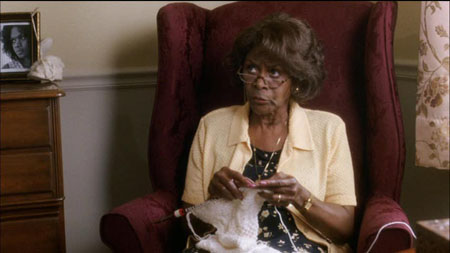
A pretty fair representation of how I looked watching these two "gems."
The absurdly melodramatic plot surrounding them doesn’t help either. There’s suspension of disbelief, and that held over ‘till Madea’s rampage with a shotgun. After that, you got plain ol’ dumber than a sack of hammers, and that lasted through the rest of the flick, up to and including the evil husband Charles’ from-left-field paralysis. The result? At no point did I every feel that this flick took place in a world resembling, you know, the real one. And it strands the actors, I feel. Tyson’s wasted, as previously noted, and Steve Harris, who has been good in other places, never seems to get a handle on Charles’ violent tonal shifts. Not that I blame him; with two years worth of research, I doubt Daniel Day Lewis could make this character, as scripted by Perry, remotely believable. Elise, who’s a terrific actress, comes the closest to giving a full performance, but after a while, her attempts to seem real and natural stand-out (in a bad way) simply because nothing else around her does.
And then there’s Perry’s acting, and this is the death blow on the flick. He pulls multiple roles here. As Brian, Helen’s brother-in-law, he acquits himself fine; his character exists in service of a message more than anything else (turning your back on the drug culture), but he’s perfectly serviceable. As Joe, Helen’s pot-smoking Uncle, Perry puts on the prosthetics for Round One, and the results are tiresome.
But it’s his Madea that’s worst, she of the shotgun-wielding, chainsaw-brandishing, “oh-God-why-did-Eddie-Murphy-make-drag-cool-again” ilk. For a movie that’s already all over the place, Madea tips the scales off the Goddamn cliff into Crazytown. I know the “Big Momma” stereotype exists, but this isn’t a character; it’s an ungainly fusion of work that Eddie Murphy and (I can’t believe I’m about to say this, but here it goes) Martin Lawrence did better. Her Madea possesses no recognizable human qualities whatsoever. Even the makeup job on Perry makes Madea look like a second cousin to Lou Gossett Jr. in Enemy Mine. The movie grinds to a halt whenever Madea’s onscreen, and any pretensions of Perry to debunk negative myths about the black community are squelched by this pandering, unfunny character’s attempts at humor. The whole thing smacks of ego, and puts a bad taste on this already-bad flick.
Diary of a Mad Black Woman is one of the worst films I’ve seen in a long time. Lazy, unfunny, wildly atonal, it’s a cinematic mess, courtesy of Tyler Perry and Co. To say that this one made me apprehensive about his future cinematic endeavors is an understatement: after this one, I was convinced he could do no right…
…which is why Daddy’s Little Girls came as somewhat of a pleasant surprise.

"Um, hi. We’re lost, and I was wondering, could you tell me how to get to Main Street? Also, a blowjob would be really nice too."
Now, just to make things completely clear: it is still not a very good movie. Perry’s direction is even more uninspired than Grant’s was on the last flick, it’s still ludicrously melodramatic in terms of plot, and every character is a one-note stereotype. I am not recommending this flick.
But I can’t flat-out condemn it either. See, Madea’s nowhere to be seen in this one, and though that might have contributed to the relatively poor theatrical grosses of the flick, her grating, unpleasant presence doesn’t torpedo what does work in the movie. There are times when this one feels like it’s set in a world closer to what you or I might call reality, and I attribute that mostly to the lack of Madea.
Oh yeah. And the (dare I say it) terrific work of Idris Elba and Gabrielle Union. As Julia and Monty, they give the two best performances I’ve seen yet in a Tyler Perry flick. It’s not as though their work here is revolutionary—Julia’s your stereotypical consummate workaholic, while Monty’s the struggling yet loving single father—but the two are so charming and appealing that they make the material work. Even though you’re already way ahead of the game in terms of how their relationship will pan out (I wonder, d’ya think since they bicker so much at they’ll ever come to like one another?), Union and Elba play off each other so well that you don’t care. Elba, in particular, deserves special mention—he takes a horribly clichéd part and adds real shading and depth to it. Maybe I’m letting too much of his brilliant work as Stringer Bell in The Wire (Buy Season 1 here, Season 2 here, and Season 3 here. Do it now. It’s the best piece of media, television or film, around) inform his performance here, but I think it actually helps his character and keeps Monty from seeming wholly pure.
If only their surroundings were as rosy. Perry’s up to his usual tricks here, and the results are not pleasing. You got his low comedy leanings, as evidenced through Julia’s string of unsuccessful dates with shitty men. These scenes are obvious and rarely funny, and I couldn’t help but think about how much better similar material was handled in the Date-a-Palooza segment of The 40-Year Old Virgin. Again, Union’s good here, it’s the material that fails here.
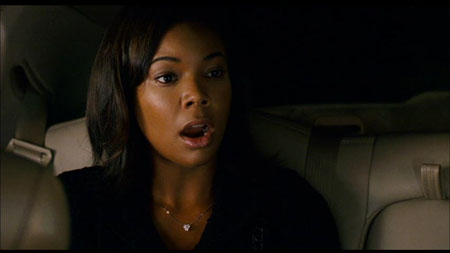
"That’s Bay’s version of Optimus Prime? Sweet Jesus, he looks like a gay Tonka truck!"
And the stuff with Monty’s ex-wife and her crack-dealer lover is awful—it’s melodrama at its worst. Tasha Smith’s Jennifer is so unredeemedly evil; you wonder how, in the real world, she would ever have a chance at taking her kids from the saintly Monty. As her boyfriend, Joseph, Gary Sturgis twirls his mustache (figuratively) like a pro, which makes sense as he’s playing a cartoon character. He certainly doesn’t match up with Anthony Mackie’s subtle, wonderfully ambiguous work in a similar role in Half Nelson, one that dared to find the humanity in a drug dealer (Watch, and buy it, here). No such luck here. And the ending? Without going into spoilers, it manages to be both ludicrous and offensive.
This stuff is terrible, and yet, I was quite fond of Elba and Union here. Anytime they were on-screen, the movie got a little better. So yes, this one was better than Diary of a Mad Black Woman. Still ass, but not as rank.
And maybe, just maybe, that’s a good thing.
The Package
Though the filmmaking here may be suspect, at least the video looks good on both films. Daddy’s Little Girls has the slight edge, but it’s a more recent flick. Diary kicks ass in the sound department, though; it actually has a pretty good DTS track. And the better box art—it’s a tasteful, sturdy, book-like presentation with Kimberly Elise’s head in silhouette. Makes the movie look better than it is. Daddy’s Little Girls is just the theatrical poster, if memory serves me.
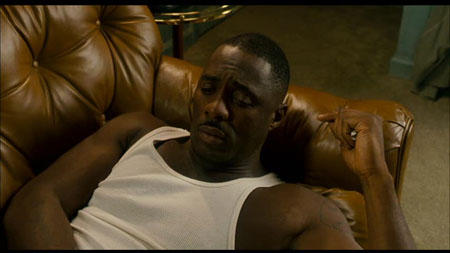
"C’mon, McNulty, lick it all up. Don’t fret now; you’ll miss me when I’m gone."
Now for features. Diary’s a Two-Disc Special Edition, so it has more, but they’re all a bit fluffy. Both commentaries are a wash. Tyler Perry has an ego the size of my Johnson (read: Texas-sized), and if you enjoy self-indulgent backslapping and boisterous laughter at one’s own jokes, this is the track for you! The Darren Grant/Kimberly Elise track is worse, though, because it’s so dull; at least Perry’s energetic.
The Making of is terrible. It’s 20-odd minutes of people saying how great the movie is. Plus, Perry does in character interviews. Avoid at all costs. Same goes for the outtakes, which are Madea-oriented, and the music montages, which are useless unless you really liked the music. But the “Reflections” feature was marginally edifying, I thought. It’s Perry discussing the movie from a religious standpoint, and while I think he’s totally full of himself, I do think that him pushing for positive change in his films is a good thing. He straight-up fails, but his intentions are good. What I can’t abide are the Who is Tyler Perry and the Tyler Perry Spotlight features. These two bits do the same thing: praise him up and down, and more often than not, it’s Perry himself (in and out of character) doing the praising. Utterly solipsistic crap, and there’s no reason to have both of these here. I thought the ATL feature was a wash too. I respect that Atlanta’s coming into its own as a flashpoint for African-American filmmaking, but we don’t get any real insight as to why this is so. The Real Mad Black Women feature was kinda nice—these women are funny and sweet, even if they’re nothing like the abomination they praise. Other than trailers (one of which is for Perry’s show, surprise surprise), we finish off with some deleted scenes, most of which deal with Brian’s wife’s drug addiction.
Daddy’s Little Girls is less stacked, feature-speaking. We got another high-energy, high-ego Perry commentary. The Cast and Crew Making Of in another non-Making of—praising a goddamn movie after the fact does not count as making it! The extended church scene was cut for a reason; at over seven minutes it’s a chore to get through. The Aquarium bit is really just a promo for the actual aquarium, which, to be fair, does look pretty cool. Might have to check it out the next time I’m in Hotlanta. And the Introducing the McClain Sisters feature just reinforces how “precious” Elba’s on-screen daughters are. We needed DVD space for this why?
I hated Diary. I can safely say it’s one of the worst films I’ve ever seen, and I can safely tell you to slag off from it. Daddy’s Little Girls is still pretty bad, but it does get a decent amount of mileage from Elba and Union’s winning performances. The features on Diary are many, but fluffy, while Daddy’s features are few, but equally fluffy. I guess that makes them preferable. All in all, Perry needs to learn that good intentions do not a good movie make. In fact, you can have a pretty fucking bad one as your end result. Let’s go with:
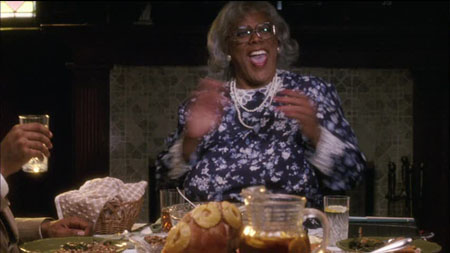
Prolonged exposure to this will cause sterility in men and ovarian cysts in women.
(Daddy’s Little Girls)
2.5 Out Of 10.0